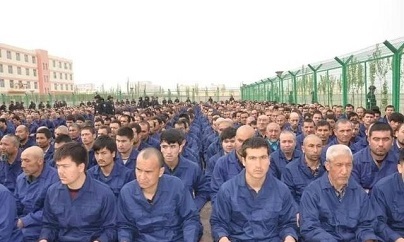The Uyghur Issue

December 15, 2020
The COVID-19 pandemic has undoubtedly been the centerpiece of 2020, constantly occupying our minds, news, and conversations, Unfortunately, the pandemic has overshadowed various other international stories that need the attention of the international community. The concepts of concentration camps and ethnic cleansing may seem like ones reserved for the atrocities committed by Germany during the Holocaust, yet they still exist for Uyghur (pronounced wee-gur) Muslims in China. The Uyghur people have lived in the Xinjiang region of Northwestern China for over a thousand years, with Chinese records of them going back to the 3rd century AD. Today over 11 million Uyghur and other Muslim minority groups live in Xinjiang. Oppression of Uyghurs in China has existed in China since the 1930s, as Chinese cultural union campaigns often ridiculed and punished Uyghurs for their peaceful cultural practices.

Oppression of Uyghurs by the Chinese government experienced a resurgence in 2014 with the beginning of the “People’s War on Terror Campaign”, which began with the imprisonment, often for life, of many important Uyghur cultural leaders. This campaign took it a step further in 2017 with the opening of “re-education camps” throughout Xinjiang under the guise of counter-terrorism and “social integration.” Hundreds of thousands of Uyghurs, along with various other ethnic minority groups in the region were put into these camps without any charges or fair trials. Using satellite imagery, the Australian Strategic Policy Institute has found over 380 of these camps and prisons in Xinjiang, with more than 60 of them being expanded or updated in 2020. Since the opening of these camps, an estimated 1-3 Million innocent men, women, and children have been detained. There they experience forced labor and inhumane treatment. It was even revealed in July of 2020 by the New York Times that millions of Chinese-produced masks that were distributed across the world (including the United States), were made with Uyghur labor. Some reports even indicate various methods of indoctrination to suppress the Uyghur peoples’ cultural and religious identities. These methods include torture such as waterboarding and even sexual abuse. Many have also been forced to commit actions that go directly against their beliefs, including being force-fed pork, changing their culturally Muslim names, and blaspheming against their god, One of the most heinous crimes found in recent investigations is the forced sterilization of thousands of Uyghur women, along with non-consensual abortions. Even Uyghurs living outside the internment camps are subjected to oppressive policies, with the Chinese government turning Xinjiang into a surveillance state where privacy is nearly nonexistent for many innocent people. Many believe that the harsh subjugation and attempts at population control placed on the Uyghur people fit the UN’s definition of genocide.
This campaign exists as the single largest mass internment of an ethnic or religious group in the world since the Holocaust. Although this may seem like an issue we have no way of ending, there are various small ways we can help. We can spread awareness, donate to Amnesty International, the Uyghur Human Rights Project, and various other human rights organizations, write to our local and federal governments to further spread awareness, and boycott Chinese products and media.





Cool Guy • Dec 26, 2020 at 4:41 pm
On folksnem this article bussin
Anonymous • Dec 23, 2020 at 3:07 am
Excellent piece. Reminds me of a quote by Elie Wiesel: “Wherever men and women are persecuted because of their race, religion, or political views, that place must—at that moment—become the center of the universe.”